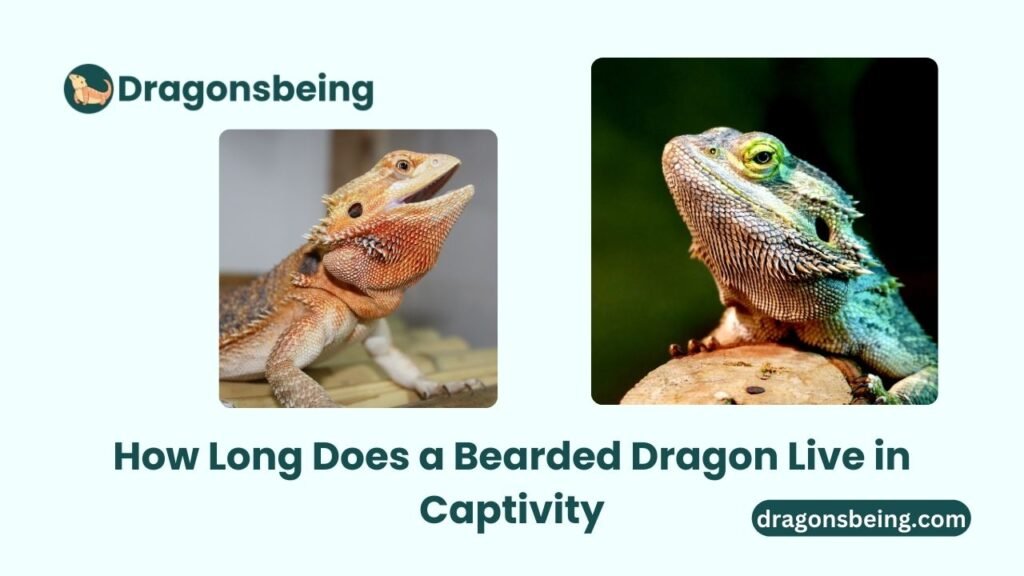Bearded dragons can live 10 to 15 years in captivity with proper care. Some may even reach 20 years under optimal conditions.
Bearded dragons, known for their friendly demeanor and unique appearance, make excellent pets. Their lifespan is a crucial factor for prospective owners. Understanding their needs helps ensure a long, healthy life. Factors such as diet, habitat, and veterinary care significantly influence their longevity.
Bearded dragons require a balanced diet rich in vitamins and minerals. Proper UVB lighting and a suitable enclosure are vital for their health. Regular veterinary check-ups can catch potential issues early. Owners should commit to ongoing education about these reptiles. With the right environment and care, bearded dragons can thrive for many years, becoming cherished companions.
Introduction To Bearded Dragon Lifespan
Bearded dragons are popular reptile pets known for their docile nature and unique appearance. Understanding the lifespan of these fascinating creatures is essential for providing them with optimal care in captivity.
Factors Influencing Lifespan
- Diet: A well-balanced diet is crucial for longevity.
- Habitat: Proper enclosure setup impacts lifespan.
- Genetics: Some beardies may live longer due to genetics.
Average Lifespan In Captivity
The average lifespan of a bearded dragon in captivity ranges between 10 to 15 years when provided with proper care and a suitable environment. By addressing key factors influencing their lifespan, you can ensure your bearded dragon lives a long and healthy life.
Optimal Habitat Setup
Creating the right habitat is crucial for a bearded dragon. A proper setup helps your pet thrive in captivity. It ensures their health and happiness. Let’s explore the key components.
Terrarium Requirements
Your bearded dragon needs a spacious terrarium. A minimum size of 40 gallons is recommended. Here are some essential requirements:
- Use glass or acrylic for visibility.
- Secure a tight-fitting lid to prevent escapes.
- Include a substrate like reptile carpet or sand.
- Add hiding spots using rocks or logs.
- Incorporate branches for climbing and basking.
Temperature And Lighting
Proper temperature and lighting are vital for health. Bearded dragons need a temperature gradient.
| Zone | Temperature (°F) |
|---|---|
| Warm Side | 90-110 |
| Cool Side | 75-85 |
| Basking Spot | 100-110 |
Use a heat lamp for basking. Provide a UVB light for at least 10-12 hours daily. This helps with calcium absorption. Regularly check temperatures with a thermometer.
Diet And Nutrition
Proper diet and nutrition play a vital role in a bearded dragon’s lifespan. A balanced diet ensures they receive essential nutrients. This helps them grow healthy and live longer.
Feeding Schedule
Establishing a consistent feeding schedule is important for your bearded dragon. Feed them at regular intervals to maintain their health. Here’s a simple feeding schedule:
| Age | Feeding Frequency | Food Types |
|---|---|---|
| Hatchlings (0-3 months) | 2-3 times daily | Insects, greens |
| Juveniles (3-12 months) | 1-2 times daily | Insects, greens, fruits |
| Adults (1 year and older) | Once daily | Greens, limited insects |
Essential Nutrients For Longevity
Bearded dragons need specific nutrients to thrive. Here are the essential nutrients:
- Protein: Important for growth and energy.
- Calcium: Supports strong bones and prevents metabolic bone disease.
- Vitamins: Essential for overall health. Vitamin D3 is crucial for calcium absorption.
- Fiber: Aids digestion and keeps their gut healthy.
Choose foods wisely. Offer a mix of insects and vegetables. Some good options include:
- Crickets
- Mealworms
- Collard greens
- Butternut squash
- Blueberries
Monitor their weight and health. Adjust the diet as needed. This ensures a long and healthy life for your bearded dragon.
Healthcare Essentials
Proper healthcare is vital for your bearded dragon’s well-being. Understanding their health needs helps ensure a long, healthy life. Regular check-ups and awareness of common health issues are crucial.
Common Health Issues
Bearded dragons can face several health challenges. Here are some common issues:
- Metabolic Bone Disease (MBD): Caused by calcium deficiency.
- Respiratory Infections: Symptoms include wheezing and lethargy.
- Parasites: Can lead to weight loss and diarrhea.
- Impaction: Occurs from ingesting substrate or foreign objects.
Recognizing these issues early can save your pet’s life. Regular observation is key.
Regular Veterinary Check-ups
Veterinary visits are essential for your dragon’s health. Schedule check-ups at least once a year. A vet can:
- Perform a physical examination.
- Test for parasites.
- Check nutritional health.
- Administer vaccinations if necessary.
Always choose a vet experienced with reptiles. This ensures your bearded dragon receives the best care possible.
The Role Of Genetics
Genetics plays a significant role in the lifespan of bearded dragons. Understanding heredity helps owners provide better care. This knowledge can enhance the quality of life for these reptiles.
Heredity Factors
Heredity influences many traits in bearded dragons, including lifespan. Key heredity factors include:
- Parent Age: Older parents may produce healthier offspring.
- Health History: Genetic predisposition to diseases impacts longevity.
- Species Variation: Different species have different lifespans.
Some bearded dragons live longer due to strong genetic backgrounds. Choosing a healthy lineage can lead to better outcomes.
Selective Breeding Impacts
Selective breeding affects the genetics of bearded dragons significantly. Breeders aim for specific traits, which can influence lifespan. Consider these points:
- Desirable Traits: Breeders often select for color and size.
- Health Considerations: Healthy breeding stock leads to stronger offspring.
- Genetic Diversity: Limited diversity may cause health issues.
Responsible breeding practices can improve the lifespan of bearded dragons. Owners should always choose reputable breeders.
Impact Of Social Interaction
Social interaction plays a crucial role in the health and happiness of a bearded dragon. These reptiles thrive on interaction, which affects their overall well-being and longevity. Understanding how social factors impact their life can help owners provide better care.
Behavioral Enrichment
Behavioral enrichment stimulates a bearded dragon’s mind. It prevents boredom and encourages natural behaviors. Here are some effective ways to provide enrichment:
- Rotate toys regularly
- Include climbing structures
- Offer different substrates
- Introduce safe plants
Engaging in interactive play is beneficial. It strengthens the bond between you and your pet. Activities like gentle handling and supervised exploration can enhance their life.
Companionship And Solitude
Bearded dragons can be social, but they also need alone time. Each dragon has a unique personality. Some may enjoy the company of other pets, while others prefer solitude. Here are key points:
| Social Needs | Signs of Stress |
|---|---|
| Enjoys interaction | Hides frequently |
| Curious about surroundings | Exhibits aggressive behavior |
| Responds well to gentle handling | Refuses food |
Monitor your bearded dragon’s behavior. Adjust interaction levels based on their comfort. A balanced approach fosters a happy and healthy life.
Importance Of Exercise
Exercise plays a vital role in the health of your bearded dragon. It keeps their muscles strong and supports their overall well-being. Regular activity can also enhance their mood and reduce stress. Without exercise, they may become lethargic and develop health issues.
Activity Levels And Longevity
Bearded dragons can live 10 to 15 years in captivity. Their activity levels directly affect their lifespan. Higher activity levels lead to:
- Better muscle tone
- Improved digestion
- Enhanced immune function
Ensure your pet gets enough exercise by providing opportunities to explore. A more active bearded dragon can enjoy a longer, healthier life.
Creating An Engaging Environment
Designing a stimulating habitat is key. Consider the following:
| Element | Description |
|---|---|
| Climbing Structures | Logs and branches for climbing |
| Hiding Spots | Caves or tunnels for security |
| Open Space | Room to roam freely |
Rotate toys and decorations regularly. This keeps their environment fresh and exciting. Use safe items that encourage exploration.
Signs Of Aging In Bearded Dragons
Bearded dragons can live up to 10-15 years in captivity. As they age, they show various signs. Knowing these signs helps owners provide better care.
Physical Changes
Physical changes indicate aging in bearded dragons. Common signs include:
- Skin Texture: Skin may become wrinkled or loose.
- Color Fading: Bright colors may dull over time.
- Weight Loss: Loss of muscle mass is common.
- Eye Clarity: Eyes may appear cloudy or sunken.
Older dragons often have slower growth rates. Regular vet check-ups help monitor these changes.
Behavioral Shifts
Behavior also changes as bearded dragons age. Key shifts include:
- Decreased Activity: Older dragons become less active.
- Changes in Appetite: They may eat less or refuse food.
- Less Interaction: Older dragons may seek solitude.
- Temperature Regulation: They may struggle to maintain body heat.
Keep an eye on these behaviors. Early detection helps ensure their well-being.
End-of-life Care
End-of-life care for your bearded dragon is crucial. This period can be tough for both the pet and the owner. Providing the right care can help ease discomfort and ensure dignity.
Comfort Measures
Creating a comfortable environment is essential. Here are some ways to provide comfort:
- Maintain a stable temperature in the habitat.
- Provide soft bedding for resting.
- Limit handling to reduce stress.
- Offer favorite foods to encourage eating.
- Keep the habitat clean and quiet.
Monitor your dragon’s behavior closely. Look for signs of pain or distress. Adjust care as needed for their comfort.
When To Consult A Vet
Knowing when to seek veterinary help is vital. Consider these signs:
- Loss of appetite for more than two days.
- Weight loss or drastic changes in appearance.
- Difficulty breathing or lethargy.
- Visible signs of pain, like hiding or aggression.
A vet can offer advice or treatment options. Early intervention may improve your dragon’s quality of life.
Contributions To Herpetology
Bearded dragons play a significant role in herpetology. Their care in captivity helps scientists understand their biology. Captive bearded dragons provide valuable insights into their lifespan and health.
Captive Breeding Programs
Captive breeding programs help maintain healthy populations of bearded dragons. These programs focus on:
- Genetic diversity
- Health monitoring
- Research on reproduction
Breeders often keep detailed records. This data aids in understanding growth patterns and lifespan.
Many species have benefited from these efforts. Here’s a table highlighting key breeding programs:
| Program Name | Location | Focus Area |
|---|---|---|
| Australian Reptile Park | Australia | Genetic diversity |
| Reptile Discovery Center | USA | Health monitoring |
| Exotic Animal Care | UK | Reproductive research |
Educational Value
Bearded dragons serve as excellent educational tools. They teach about reptiles and their habitats. Schools and zoos often use them in programs.
Benefits of using bearded dragons for education include:
- Hands-on learning experiences
- Understanding animal behavior
- Promoting conservation awareness
Students learn responsibility through proper care. Observing these creatures fosters a love for wildlife.
Bearded dragons also demonstrate how to maintain a balanced ecosystem. Their presence in classrooms encourages curiosity about nature.
Frequently Asked Questions
How Long Can A Bearded Dragon Live?
Bearded dragons typically live 10 to 15 years in captivity with proper care and habitat.
What Factors Affect Bearded Dragon Lifespan?
Diet, habitat conditions, and health care significantly influence the lifespan of bearded dragons in captivity.
Can Bearded Dragons Live Longer With Good Care?
Yes, optimal diet, proper UV lighting, and regular vet check-ups can extend their lifespan beyond 15 years.
Do Bearded Dragons Live Longer In Captivity?
Yes, captivity generally offers a controlled environment, which can lead to a longer lifespan compared to the wild.
What Are Common Health Issues For Bearded Dragons?
Common issues include metabolic bone disease, respiratory infections, and parasites, all of which can impact longevity.
Conclusion
Bearded dragons can live a long, fulfilling life in captivity with proper care. Providing a balanced diet, suitable habitat, and regular veterinary check-ups can significantly enhance their lifespan. Understanding their needs is essential for any owner. With the right attention, these fascinating reptiles can thrive for over a decade.

Hi, I’m Dr. Michelle Mayers, a veterinary professional with a deep passion for animal health and well-being. Over the years, I’ve dedicated my life to caring for animals and helping pet owners better understand their furry, feathered, or scaly companions. On my blog, Dragonsbeing, I share insights, tips, and stories that aim to educate, inspire, and connect with fellow animal lovers. Join me at Dragonsbeing as we explore the fascinating world of veterinary care and celebrate the special bond between humans and animals!


